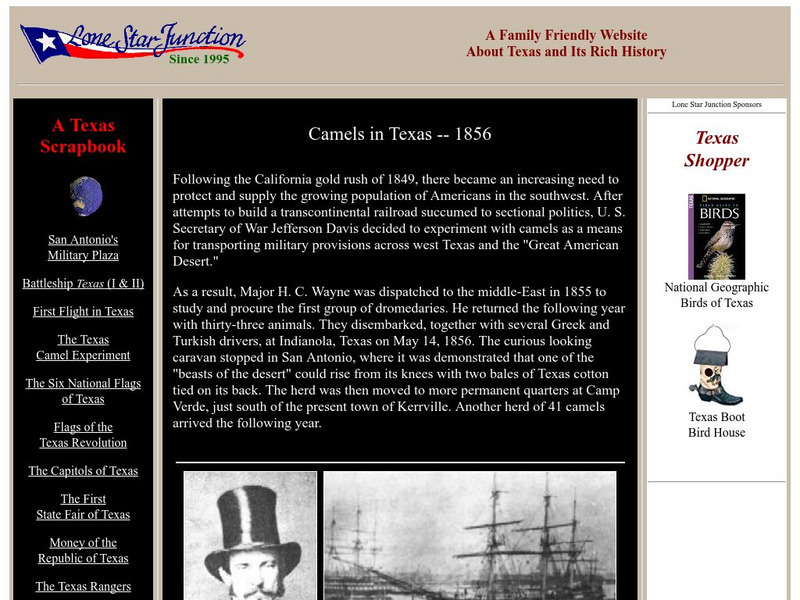BBC
Bbc: Nature Wildfacts: Dromedary Camel
The world's most common camel is the Dromedary. Find out more on the Dromedary through this detailed fact sheet and photos.
The BIG zoo
The Big Zoo: Dromedarian Camel (Camelus Dromedarius)
This site provides a general overview of the dromedary camel. Content explores what this animal eats, its desert habitat, existing social structure, and more.
The BIG zoo
The Big Zoo: Bactrian Camel (Camelus Bactrianus)
This site provides a general overview of the Bactrian camel. Content details this animal's diet, habitat, social structure, and predators.
BBC
Bbc Nature: Camel Spiders
Camel spiders have a nightmarish reputation. Urban legends, fueled by the appearance of their extra large, powerful mouthparts, their voracious appetite, and their tremendous speed, surround these hairy arachnids. Learn more about camel...
Sheppard Software
Sheppard Software: Camel Spider
This site gives an in-depth description of a camel spider, including its behavior, appearance, reproduction, and classification. The site includes photos and illustrations and an interactive quiz to test your understanding.
Canadian Museum of Nature
Canadian Museum of Nature: Bactrian Camel
Bactrian camels are found wild in the Gobi Desert, and in the grasslands of China and Mongolia. Details about this animal can be found here along with photos.
Lone Star Junction
Lone Star Junction: Camels in Texas 1856
Describes an experiment in the 1850s to use camels to transport goods in west Texas and as far as California.
Ducksters
Ducksters: Animals for Kids: Bactrian Camel
Kids learn about the Bactrian Camel. Animals that can survive the tough desert without water or food are now endangered.
Saint Louis Zoo
Saint Louis Zoo: Bactrian Camel
Discover fun facts and learn about the habitat, breeding, appearance, diet, and conservation status of the Bactrian camel.
Open Library of the Internet Archive
Open Library: How the Camel Got His Hump
This ebook version of Rudyard Kipling's How The Camel Got His Hump has been made available in multiple formats by the Open Library. Editions of the full novel, organized by year of publication, may be accessed here.
Blackdog Media
Classic Reader: The Camel's Back by F. Scott Fitzgerald
Read the full text of the humorous novel "The Camel's Back" by F. Scott Fitzgerald.
Blackdog Media
Classic Reader: How the Camel Got His Hump by Rudyard Kipling
Read the full text of the fable "How the Camel Got His Hump" by Rudyard Kipling.
Other
Texas Bob: The Camel Experiment: June 24 August 15, 1860
Journal entries are written by William H. Echols, Brevet Second Army Lieutenant, which told the story of the Army's Camel Experiment in the Texas desert, where camels were tested to determine if they were a superior method of...
Curated OER
Bbc Nature: Wildlife: Bactrian Camel
Photograph of a Bactrian camel standing in the desert.
Curated OER
Eternal Egypt: Textile Fragment With Camels
The Tulunid textile fragment has a red band decorated with white and green camels separated by geometric designs.
Blackdog Media
Classic Reader: Authors: F. Scott Fitzgerald
This site features the author F. Scott Fitzgerald including the full text of 10 novels and two dramas: Mr. Icky and Porcelain and Pink. The novels include titles such as The Beautiful and the Damned, The Camel's Back, and The Curious...
Countries and Their Cultures
Countries and Their Cultures: Bedouin
Bedouin societies are found in the arid steppe regions of Arabia and North Africa and along the margins of rain-fed cultivation. Bedouin groups move their animals to areas where pasture is regularly found. Often these societies plant...
Countries and Their Cultures
Countries and Their Cultures: Afar
The Afar occupy an area of Djibouti and northeastern Ethiopia, sometimes called the Afar Triangle. There is a long history of hostility between the Afar and the surrounding groups; the Afar are often considered fierce and warlike. The...
Denver Zoo
Denver Zoo: Llama
The Denver Zoo provides an in-depth overview of llamas highlighting their habitats, range, adaptations, diet, physical characteristics, and more.
Curated OER
Web Gallery of Art: Physiognomic Heads Inspired by a Camel
An image of "Physiognomic Heads Inspired by a Camel", created by Charles Le Brun, c. 1670 (Ink and wash, 230 x 327 mm).
Curated OER
Web Gallery of Art: Fortress With Arabs Riding Camels
An image of "Fortress with Arabs Riding Camels", created by Tivadar Csontvary Kosztkaz (Oil on canvas, 88 x 140 cm).
Other
Stan Milosevic : Manitoba Photos Town Statues
A camel in Manitoba? A giant mushroom? By visiting the statues found throughout the small communities of Manitoba, you have the chance to learn about Manitoba's historical heritage, flora and fauna, animals, and economy.
Other popular searches
- Acrostic Poem About Camels
- Camels Acrostic Poem
- Comparing Camels
- Arabian/bactrian Camels
- Camels Terminology
- Lesson Plans on Camels
- Ancient Camels
- African Camels
- Learn About Camels
- Lesson Plan on Camels
- Bactrian Camels
- Bulletin Board About Camels














